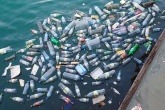Plastics industry misled public to sell “false promise” of recycling
Petrochemical companies should be held accountable for the “devastating harms” they have caused by deceiving the public about the viability of plastics recycling, according to The Center for Climate Integrity (CCI).
 In their latest report, the US-based environmental research and advocacy group has accused fossil fuel and plastics producers of waging a “decades-long campaign of fraud and deception” to promote plastics recycling, despite being aware of its limitations.
In their latest report, the US-based environmental research and advocacy group has accused fossil fuel and plastics producers of waging a “decades-long campaign of fraud and deception” to promote plastics recycling, despite being aware of its limitations.
The report, titled The Fraud of Plastic Recycling: How Big Oil and the plastics industry deceived the public for decades and caused the plastic waste crisis, claims that by deliberately misleading policymakers and consumers on the viability of plastics recycling, the petrochemical industry discouraged the development of more effective, more sustainable waste management strategies.
Petrochemical companies such as ExxonMobil, Shell and Dow should therefore be held liable for their contribution to the plastic waste crisis, the report argues.
Plastics recycling
The CCI highlights several challenges associated with plastics recycling. First, it can be difficult to separate plastic waste from other materials such as paper, metals, adhesives or colourants, as well as separate different types of plastic polymers.
The report explains that PET, for example, is widely accepted by municipal recycling programmes in the US but PET bottles must be separated from PET thermoform containers, and clear PET bottles must be separated from green PET bottles.
Plastics can also leach toxic chemicals when recycled, the CCI warns, so cannot be used to produce high-contact products. Further, because the quality of plastic degrades during the recycling process, it is unsuitable for certain purposes and can only be recycled once or twice.
The report states that “plastics have a linear rather than circular lifespan - when viable, recycling provides only a brief delay on their inevitable journey to landfills, incinerators or the environment” and later argues that the plastics industry “co-opted” the language of the circular economy to ‘sell’ plastics recycling as a waste management solution.
Another challenge outlined by the CCI is the fact that recycling plastic is more expensive than producing virgin plastic from fossil fuels. Relatedly, there is a lack of demand for recycled plastic. According to the CCI report, viable markets only exist for polyethylene terephthalate (PET) and high density polyethylene (HDPE).
As a result of these limitations, plastics which are technically recyclable are often not recycled or have limited use in practice. Globally, only nine per cent of plastic is recycled, a rate substantially lower than those for other common materials. Most plastic is landfilled, incinerated or leaks into the environment.
Big Oil knew
The CCI asserts that petrochemical companies were aware of the limitations of plastics recycling decades ago, but endorsed it as a waste management solution to increase demand for and avoid legislative restrictions on their products.
Drawing on articles, industry reports, conference papers and internal company memos, the investigation cites industry insiders referring to plastics recycling as “virtually hopeless”, “[not] a permanent solid waste solution”, having “no effective marketing mechanisms for trade” and a sector where “supply far outstrips demand” as early as the 1960s.
Additionally, the CCI highlights that the petrochemical industry boosted demand for their products, and consequently contributed to global pollution, by marketing plastic as disposable. For example, at a 1956 conference run by the Society of the Plastics Industry, a trade group now called the Plastics Industry Association, attendees were told to aim for “expendability” - their products should end up “in the garbage wagon”.
Half of the plastic produced each year is single-use and millions of metric tonnes of it end up in our oceans and rivers.
Anecdotal evidence suggests that in the 80s and 90s, fossil fuel and plastics companies were motivated by the threat of legislative action. In 1992, a representative from Occidental Chemical, which manufactures chemicals used in plastics, testified to Congress that there was a “rush to demonstrate environmental purity… The call was to recycle or be banned”. Indeed, according to the Society of the Plastics Industry (SPI), a special petrochemical Public Affairs Council was established “to fight off restrictive legislation everywhere”.
The CCI report details how plastics companies ‘sold’ plastics recycling through a variety of tactics. These include establishing front groups, funding advertisements and PR campaigns, and producing educational content for schools designed to persuade the public that plastic is generally recyclable.
Petrochemical companies also reportedly changed their plastic recycling metrics to artificially inflate recycling rates; publicised investment in ‘performative’ initiatives such as research projects and pilot studies, but “shut [these] down quietly when the threat of regulation passed”; and set unachievable recycling targets which “matched consumer expectations and placated the public”.
CCI’s analysis further documents how the widely recognised symbol for recycling - a triangle of ‘chasing arrows’ - was introduced by the SPI to enable consumers to identify different types of plastic for recycling. This was despite the SPI having stated two years earlier that attempts to simplify plastic sorting by labelling the material composition of containers had “limited practicality”.
What now?
Plastic pollution poses serious environmental, economic and health-related threats, with one study estimating that humans ingest up to five grams (or the equivalent of one credit card worth) of plastic per week.
The CCI suggests that as the public becomes more aware of this problem, demand for improved plastic management is increasing. However, the organisation is sceptical of advanced/chemical recycling, which it claims is being touted by the plastics industry but is not feasible at scale and often does not produce new plastic products.
The CCI report concludes that “municipalities and states are likely to pursue litigation” against petrochemical companies, which could “make [them] pay for the devastating harms they have caused to communities, and open the door to real solutions that are currently out of reach”.











